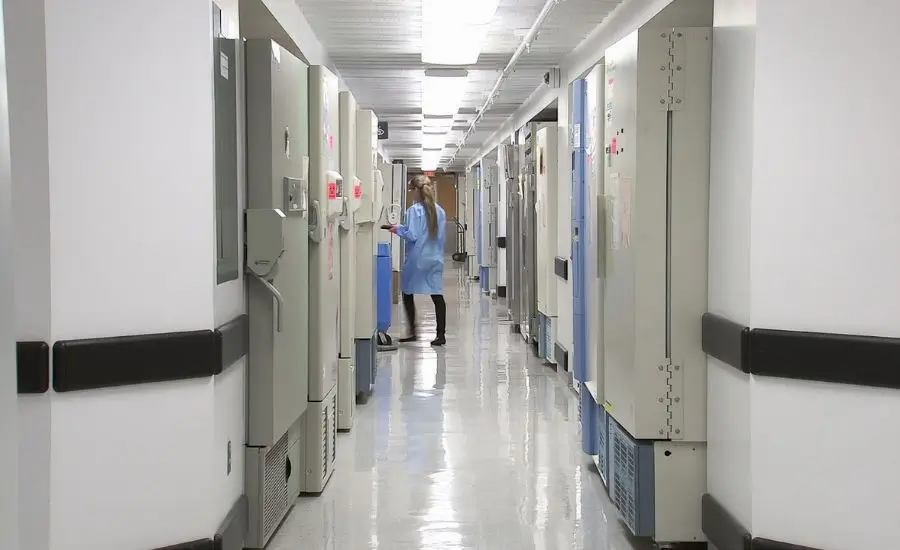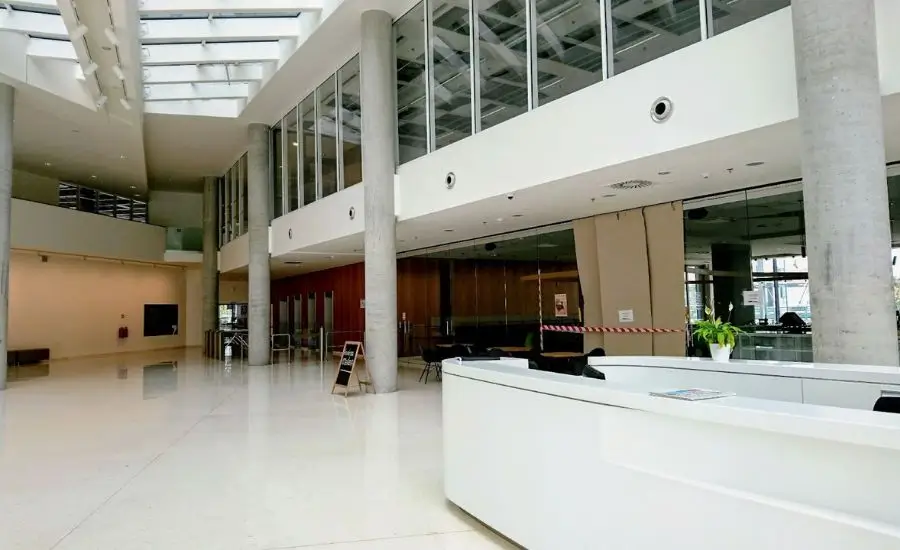Written By: Brad Campbell | May 21, 2025
Hospitals, psychiatric facilities, and other healthcare institutions face unique security risks that set them apart from most other types of commercial buildings.
Patients in distress, individuals with violent tendencies, or those under legal custody can create unpredictable situations that require strong security measures to protect both staff and other patients.
One of the most critical, yet often overlooked, vulnerabilities in hospitals is glass security. Windows, doors, and partitions made of standard window glass or tempered safety glass can easily break upon impact, creating a severe hazard.
A broken window can lead to self-harm, unauthorized egress, or even a violent attack on medical personnel.
To mitigate these risks, hospitals must install human impact-resistant security glazing — a reinforced type of glass or glass-like glazing designed to withstand forceful, intentional impacts without breaking.
Glass windows and partitions are an integral part of hospital design, providing natural light, visibility, and a more open, welcoming environment.
However, standard glass presents serious dangers in medical settings, especially in areas where patient behavior can be unpredictable or aggressive.
Hospitals and psychiatric wards often treat individuals experiencing extreme emotional distress. Some patients may attempt self-harm by breaking glass and using the shards to injure themselves.
In high-risk psychiatric units, unsecured glass poses an immediate safety concern, as patients in crisis may act impulsively when left unsupervised.
Unsecured windows can also lead to unauthorized patient escapes, known as unwanted egress. This is particularly concerning in psychiatric hospitals, substance abuse recovery centers, and medical facilities treating patients under legal custody.

Individuals determined to flee may break windows and climb out, leading to potentially fatal falls or exposure to dangerous environments outside the hospital. Those in police custody or undergoing forensic psychiatric evaluations may also attempt to escape before authorities intervene.
Hospital employees frequently interact with patients and visitors in high-stress situations. Individuals experiencing mental health crises, intoxication, or emotional distress may lash out violently.
Glass partitions, commonly used in reception areas and nurse stations, can be a weak point if an aggressive individual decides to attack staff members. Without security glazing, a single impact can shatter the glass, leaving medical personnel defenseless against physical assaults.
Although hospitals are not typically high-priority targets for crime, they are not immune to break-ins or targeted attacks.
In emergency departments and psychiatric wards, unauthorized individuals may attempt to force entry to access controlled substances, attack patients, or retrieve someone in custody. Traditional glass windows and doors are highly vulnerable in these scenarios, making impact-resistant security glazing an essential barrier against forced entry.

To address risks and protect glass, hospitals should install security glazing with human impact resistance certification. Unlike standard annealed or tempered glass, this type of impact-resistant glazing is engineered to withstand powerful blows without breaking or dislodging from the frame.
Human impact-resistant security glazing is tested under strict laboratory conditions to ensure it meets impact resistance standards. These tests simulate real-world scenarios where an individual might strike a window with their body, fists, or a heavy object. If the glazing remains intact after repeated impacts, it receives human impact resistance certification for use in hospitals and other high-risk environments.
Security glazing with this certification ensures that:
Not all hospital areas require impact-resistant glazing, but some locations have a significantly higher risk of incidents. Some of the most critical areas to consider reinforcing glass hospital windows and doors with security glazing include:
Hospital rooms must balance safety, security, and comfort, particularly in psychiatric facilities where patient behavior may be unpredictable.
Windows are essential for mental well-being, as natural light and views of the outdoors have been shown to reduce stress and improve recovery times. However, unprotected windows also present an opportunity for self-harm or egress.
By installing human impact-resistant glazing, hospitals can create secure, unbreakable windows that maintain natural light and visibility while eliminating safety risks.
Psychiatric wards house patients who may be at higher risk for self-harm, aggression, or egress attempts. Every window, door, and glass partition in these areas should be equipped with impact-resistant glazing to ensure patient safety.
Emergency rooms are some of the most chaotic and unpredictable places in hospitals. Patients and visitors experiencing distress may become agitated, violent, or aggressive toward staff.

Reception areas and nurse stations should be equipped with impact-resistant security glazing to prevent direct physical assaults against hospital personnel.
Some hospitals have holding areas for patients in police custody or under psychiatric evaluation. In these cases, high-security glazing is essential to prevent escape attempts and protect staff from potential violence.
For hospitals seeking proven human impact resistance, AP-Series 25 from Riot Glass is the ideal solution.

AP25 is a containment-grade polycarbonate glazing shield designed to withstand high-force impacts without breaking. Unlike traditional glass and even other types of security glazing, AP25 is:
AP25 provides superior glass protection for hospital windows, doors, and partitions, ensuring a secure environment for patients, staff, and visitors alike.
In some situations, human impact-resistant glass alone is not enough. Hospitals in high-crime areas or those treating potentially violent patients may require bullet-resistant glazing for greater security.
Bullet-resistant glass can stop multiple rounds of gunfire and remain a barrier to forced entry even after being penetrated, protecting hospital staff and patients in active threat situations.
For hospitals at risk of targeted violence or gang-related incidents, ballistic-rated security glazing provides essential life-saving protection.
Glass security is an essential but often under-addressed component of hospital safety. From preventing self-harm and egress attempts to protecting staff from violence, human impact-resistant glazing is a critical investment in hospital security.
Riot Glass provides the most advanced security glazing solutions for healthcare facilities on the market. Whether you need human impact resistance, forced entry protection, or ballistic-rated glazing, we have a solution tailored to your hospital’s needs.
Contact Riot Glass today to schedule a consultation and learn how we can help strengthen hospital security.

HOW CAN WE HELP YOU?
